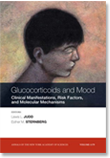Books, Articles and Abstracts
Adverse Consequences of Glucocorticoid Medication: Psychological, Cognitive, and Behavioral Effects
Lewis L. Judd, M.D., Pamela J. Schettler, Ph.D., E. Sherwood Brown, M.D., Ph.D., Owen M. Wolkowitz, M.D., Esther M. Sternberg, M.D., Bruce G. Bender, Ph.D., Karen Bulloch, Ph.D., John A. Cidlowski, Ph.D., E. Ronald de Kloet, Ph.D., Laurence Fardet, M.D., Ph.D., Marian JoŽls, Ph.D., Donald Y.M. Leung, M.D., Ph.D., Bruce S. McEwen, Ph.D., Benno Roozendaal, Ph.D., Elisabeth F.C. Van Rossum, M.D., Ph.D., Junyoung Ahn, B.S., David W. Brown, M.D., Aaron Plitt, B.A.., Gagandeep Singh, M.D.
Glucocorticoids are the most commonly prescribed anti-inflammatory/immunosuppressant medications worldwide. This article highlights the risk of clinically significant and sometimes severe psychological, cognitive, and behavioral disturbances that may be associated with glucocorticoid use, as well as ways to prevent and treat these disturbances...
 Read article in The American Journal of Psychiatry
Read article in The American Journal of Psychiatry
Glucocorticoids and Mood: Clinical Manifestations, Risk Factors and Molecular Mechanisms (Annals of the New York Academy of Sciences)
Lewis L. Judd, UCSD Medical School (Co-editor), and Esther M. Sternberg, PhD and M.D., Research Director at The Arizona Center for Integrative Medicine, University of Arizona (Co-editor)
This volume explores the effects of glucocorticoids on mood and the mechanisms mediating these effects, including aspects of the clinical effects of glucocorticoids in a variety of illnesses and in health, including molecular mechanisms, glucocorticoid resistance and sensitivity, glucocorticoid receptor polymorphisms, and implications for therapy.
 Available for purchase at Amazon.
Available for purchase at Amazon.
Psychiatric complications of treatment with corticosteroids: Review with case report
Heather A. Kenna,* MA, Amy W. Poon, MD, C. Paula de los Angeles, BA and
Lorrin M. Koran, MD
Department of Psychiatry and Behavioral Sciences, Stanford University Medical Center, Stanford, USA
Corticosteroids are widely used in modern medicine but can result in troubling psychiatric side-effects. Physicians and other medical professionals should be aware of the potential for these side-effects, possible means of prevention, and efficacious treatments...
Case Reports
Steroid-Induced Mania Treated with Aripiprazole
Ryan J. Kimmel, M.D., Heidi Combs, M.D.
The Academy of Psychosomatic Medicine
Brown and Chandler reviewed the literature on significant psychiatric side effects of corticosteroids, noting presentations of depression, mania, psychosis, and memory deficits...
The Neuropsychiatric Sequelae of Steroid Treatment
Benjamin H. Flores, MD and
Heather Kenna Gumina, MA
Department of Psychiatry and Behavioral Sciences, Stanford
University, Stanford, CA
“...the specific types of neuropsychiatric impairments comprise a range of symptoms from anxiety, irritability and impaired cognition to depression, mania, psychosis, and suicidality. ”
The following review of the topic of the neurpsychiatric sequelae of steroid treatment is based on a review of the PubMed database. Over 80 scientific articles on this topic were found and they encompass approximately the last 30 years of published research. In reviewing these articles, several conclusions can be made...
A Review of Clinical Research and Pain Management in Women
Witney G. McKiernan, RN
University of California, San Francisco
“Over the past forty years, the role of women as subjects in clinical trials for the study of new drugs has been undervalued and their participation limited. ”
The involvement of women in clinical research has fluctuated in the course of recent medical history. Over the past fifteen years, the enactment of federal policies supporting gender-based research reflects a new appreciation of the importance of including women in clinical research...
Elevated Neuroimmune Biomarkers in Sweat Patches and Plasma of Premenopausal Women with Major Depressive Disorder in Remission: The POWER Study Group
Giovanni Cizza, Andrea H. Marques, Farideh Eskandari, Israel C. Christie, Sara Torvik, Marni N. Silverman, Terry M. Phillips, and Esther M. Sternberg, for the POWER Study Group
Background: Major depressive disorder (MDD) is inconsistently associated with elevations in proinflammatory cytokines and neuropeptides. We used a skin sweat patch, recently validated in healthy control subjects, and recycling immunoaffinity chromatography to measure neuroimmune biomarkers in patients with MDD mostly in remission.

